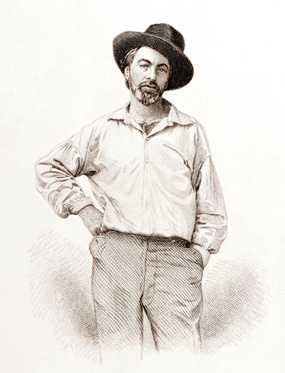The other day I was looking at some of those stunning seascapes by Ivan Aivazovsky, the nineteenth century Russian painter, who’s regarded as one of the greatest marine artists in history. It’s easy to see why. If these things interest you, there are several websites where you can see his remarkable work.
Aivazovsky is one of many artists whose work was influenced by the sea but because our small planet is mostly covered by water, it’s not surprising that the sea has had such a profound influence on the arts. Two of John Masefield’s best-known poems are about the sea although he wrote many other sea poems. The evocative verses entitled Sea Fever contain the request for a tall ship, and the line was once quoted by Captain James T. Kirk in a 1980s episode of the television series Star Trek.
 Walt Whitman in 1854 aged 35. (Engraving: Samuel Hollyer)
Walt Whitman in 1854 aged 35. (Engraving: Samuel Hollyer)
In Britain, you can’t go very far without coming to a coastline, which is perhaps why the sea has influenced so many British writers and composers. Benjamin Britten, born in a fishing port in Suffolk, found inspiration in the sea and so did Arnold Bax and Edward Elgar whose Sea Pictures are still a great favourite in Britain.
In 1905, the conductor Sir Henry Wood composed his Fantasia on British Sea Songs, celebrating the centenary of the Battle of Trafalgar. Wood also founded London’s “Promenade Concerts”, a series of summer concerts which have been held every year on and off since 1895. They’re known as “The Proms” and Wood’s Fantasia on British Sea Songs is traditionally played at the lively last concert in each series.
It’s to the Proms we turn for this week’s music. Both works are by English composers, both require orchestra, chorus and soloists, and both were recorded at the Promenade Concerts. And of course, both were inspired by the sea. What’s not immediately obvious is that both works are settings of poems by Walt Whitman.
Frederick Delius (1862-1934): Sea Drift. Bryn Terfel (bass-baritone), BBC Symphony Chorus, BBC Symphony Orchestra cond. Sir Mark Elder (Duration: c. 25:00; Video: 720p HD)
Frederick Delius was born to German parents in the north of England and by all accounts he retained a noticeable Yorkshire accent throughout his life. Sea Drift takes its name from one of Whitman’s poems in Leaves of Grass collection. It’s a large-scale work written in France where Delius lived for most of his adult life with the result that it was difficult for him to arrange performances in Britain. Sea Drift was composed between 1903 and 1904 and was first performed in Germany a couple of years later.
The first performance in England was conducted by Henry Wood in 1908 at the Sheffield Festival. It was later performed in Manchester though it was reported that there were more people on the platform taking part in the concert than there were listeners in the audience. Even so, this is a delightful work.
The performance on this video was recorded by the BBC at the first night of The Proms in 2012 and as usual the audio quality and video production are exemplary. It also has the added advantage of subtitles.
Ralph Vaughan Williams (1872-1958): A Sea Symphony. BBC Symphony Chorus, BBC Proms Youth Choir, BBC Symphony Orchestra cond. Sakari Oramo. (Duration: 1:12:25; Video: 1080p HD)
The music of Ralph Vaughan Williams is so established in his home country that British musicians often refer to him simply as “RVW” but his name can be a minefield for foreigners. Firstly, his surname is “Vaughan Williams” not just “Williams” and secondly, his first name is pronounced “Rafe” to rhyme with “safe”. During his long and prolific life he wrote nine magnificent symphonies for which he is best-known, a great deal of choral works and music for stage and screen. Strangely enough, Vaughan Williams did not number his first three symphonies, except I suppose by implication when he wrote his Symphony No 4.
The Sea Symphony was composed between 1903 and 1909 and it’s his first and longest symphony and his first large-scale work. Whitman’s poems were not widely known in Britain at the time but Vaughan Williams was attracted to them not only for their thematic content but also for their use of free verse. The symphony uses five of Whitman’s lesser-known poems. The first three movements use poems from Leaves of Grass and the last movement uses text from Passage to India.
The Sea Symphony is scored for vocal soloists and a massive chorus and orchestra and this performance is brilliantly directed by the Finnish conductor Sakari Oramo. There are some thrilling moments and some remarkably beautiful music. Towards the end of the work there’s a sublime duet for the soprano and baritone soloists and the symphony ends almost inaudibly in a mood of serene radiance.




